Of all the versions of Chicken or Pork Adobo I have tried, this Chinese-style version (no vinegar adobo) is my favorite! Sweet, savory, and delicious! Serve with rice.
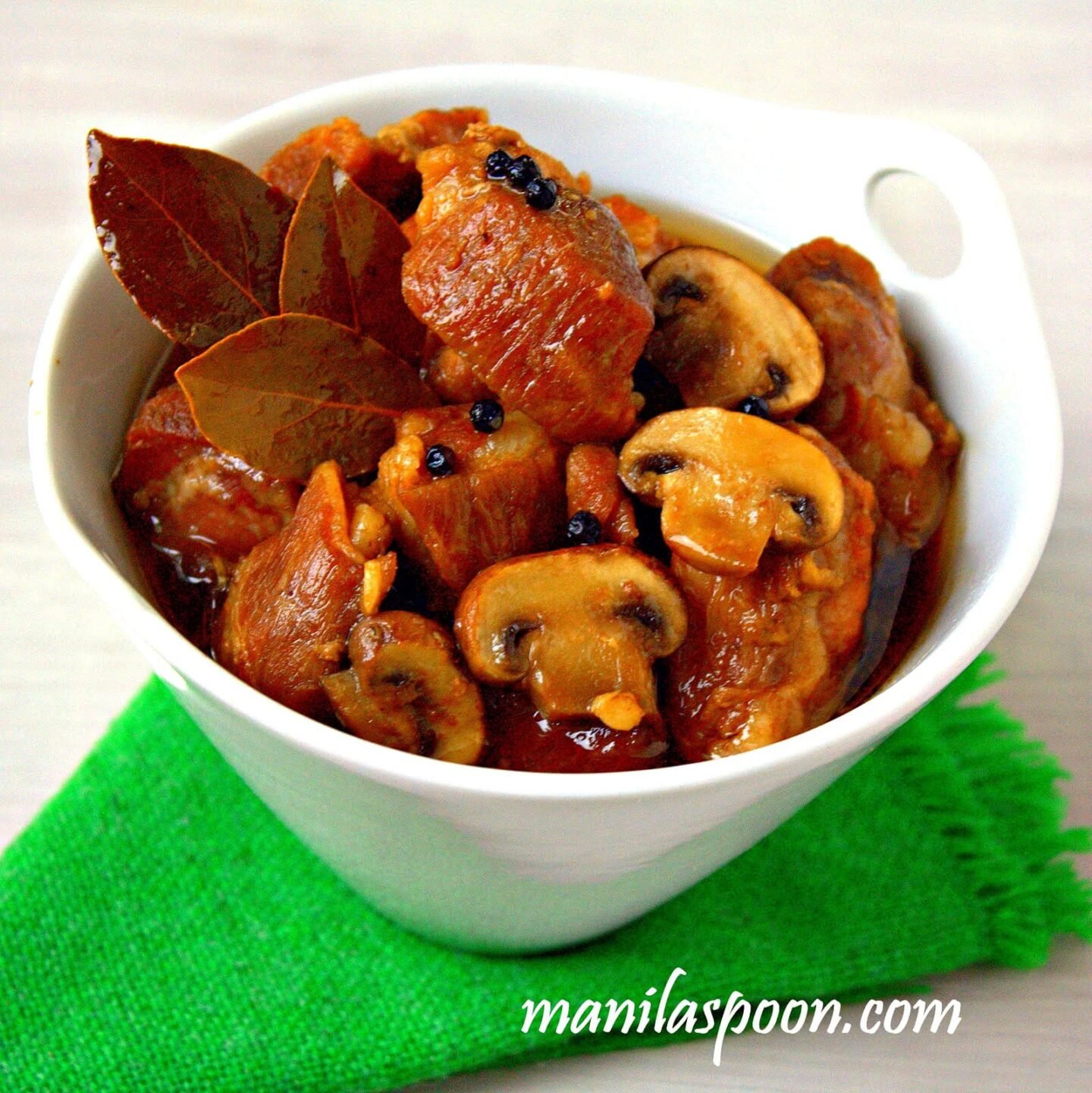
If there is a dish that defines what Filipino cuisine is all about – it’s adobo, the unofficial, national dish of the Philippine islands. There are as many versions of adobo as there are many islands in the Philippines.
Perhaps not as many as 7,107 islands (the whole Philippine archipelago) but ask each Filipino family and each will tell you their own adobo recipe handed down from one generation to another differentiated not so much by the kind of ingredients they use but more by the style or technique in cooking the dish.
Adobo always has meat – that’s the star of the dish. It can either be chicken or pork or a combination of both. While the name is of Spanish origin and is similar in some ways to the Latin/Hispanic “adobo” in the sense that meat is steeped in or immersed in a sauce and cooked in it, adobo in the Philippines refers mainly to the dish (as in Pork adobo) rather than a cooking technique.
Typically, adobo is cooked in a soy and vinegar sauce with bay leaves, lots of garlic, black peppercorns (whole or crushed), and maybe sweetened with a little sugar or even pineapple juice or syrup. Because of the long and slow cooking, the meat absorbs the delicious flavor of the sauce and is so good paired with rice.
Normally, we cook a lot of adobo so we have leftovers that can be re-heated day after day. The longer the adobo stands (in the fridge of course, though in the olden times, it’s the vinegar that served as its preservative) the better the taste.
When you have some left-overs (if you ever have some ’cause you may want to eat it all in one sitting – so more-ish!) serve it with fried rice and some fried eggs and you have a classic Pinoy breakfast – AD-SI-LOG – short name for Adobo (this dish) – Sinangag (Fried Rice) – and Itlog (Fried Eggs). Yum!
For this particular version, I depart from the usual adobo (though I will be posting a recipe for the classic adobo in a future post). Here I am making an adobo without using vinegar – Chinese style.
For this, I am deeply indebted to my friend Rebecca who graciously shared with me the ingredients she used and the way to make it. After I tasted the adobo she brought in one of our Filipino parties, I just had to get her recipe.
It’s so good you won’t even miss the vinegar! I have never made pork adobo any other way! For me, this is the ultimate pork adobo. Even my husband (not really a big pork fan) loves this and never says no when this is on the table.
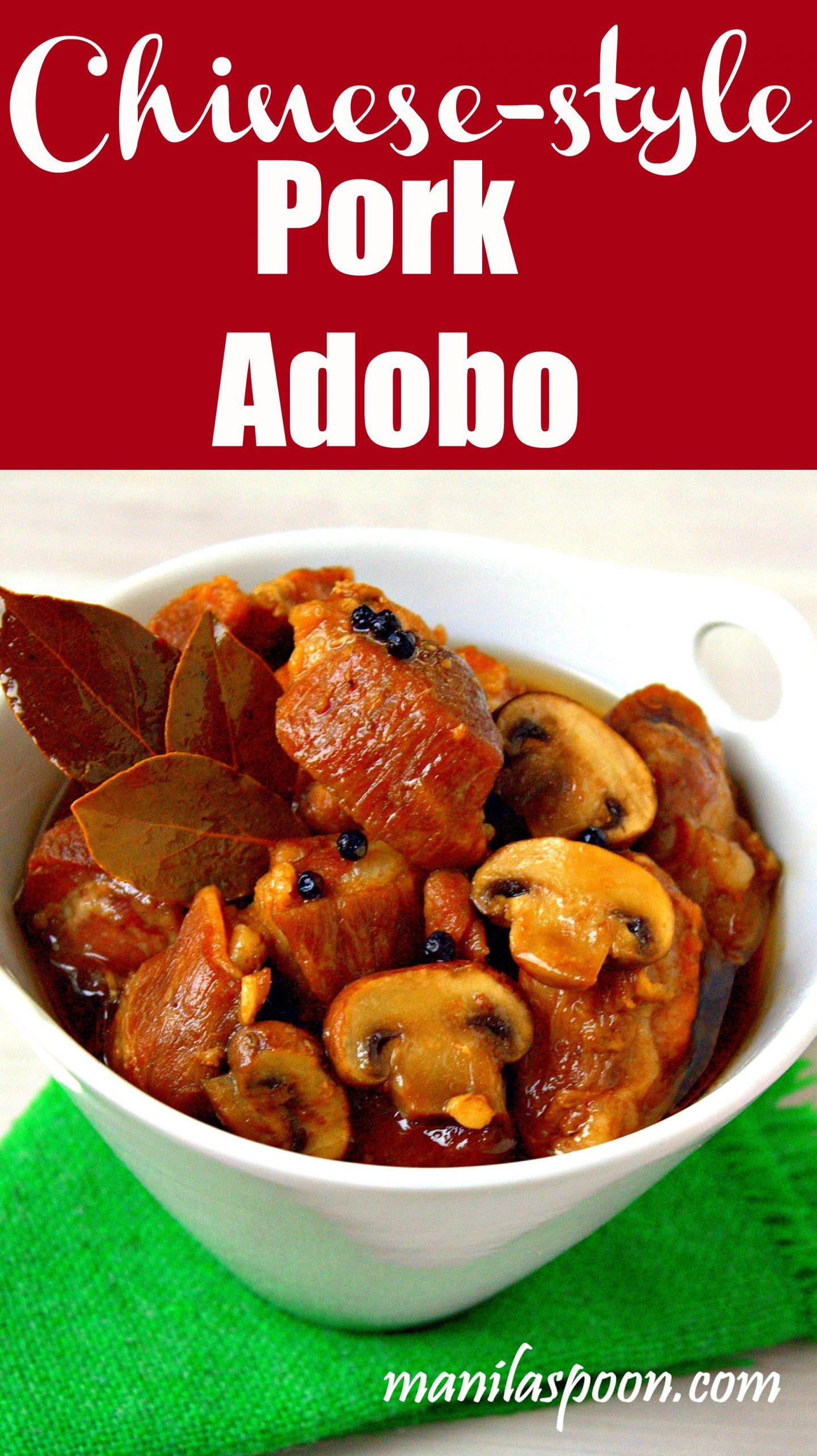
What I particularly love about this adobo is the addition of mushrooms. I have seen adobo with pineapple rings but never one with mushrooms and this gives the adobo even more depth in flavor and adds a lot in texture.
I have tried many kinds of mushrooms – both dried and fresh shiitake, enoki, mini-portobellos, and the common white button mushrooms. Any of them are great for this dish but the best for me are the fresh shiitake ’cause they are so meaty and fully absorb the flavor. If using dried shitake, don’t forget to rehydrate them first before using them and keep the liquid used in rehydrating them ’cause you can add that into the sauce for an even better flavor (if that is even possible with this already yummy sauce!).
So here goes the yummiest and easiest Adobo ever!
If you like what you see and would like to receive new recipe updates, we’d love you to subscribe to our posts or join our site. Needless to say, we’d love you to like us on Facebook and Instagram, too where you can get more recipes and updates. Thanks and happy browsing!
FOR FULL RECIPE & INSTRUCTIONS and to PRINT, SEE RECIPE CARD BELOW.
WHAT ARE THE INGREDIENTS TO MAKE THIS ULTIMATE PORK ADOBO (CHINESE-STYLE)?
- 1 kilo / 2.2 lbs pork (get the part with some fat on it like pork shoulder, boneless country-style ribs, or pork belly)
- 1 1/2 Tbsp Oyster sauce
- 2 Tbsp Brown sugar, adjust to taste
- 1/4 cup Soy sauce – I use Kikkoman.
- 6-8 Garlic cloves, minced or crushed or chopped (a small head of garlic may be used)
- 2 Bay leaves
- Freshly ground pepper (or whole black peppercorns), to taste
- 8 oz fresh mini-bella/portobello mushrooms or 2 – 4 oz shiitake mushrooms (fresh or dry) – see notes on how to prep the dry shiitake mushrooms
- A few drops of sesame oil (Very essential!)
HOW DO YOU MAKE THIS ULTIMATE PORK ADOBO (CHINESE-STYLE)?
Clean the pork. Cut up the pork adobo style – about 1 1/2 – 2 inch cubes or chunks. They will shrink as they cook so I make it a little bigger.
In a deep pan or a Dutch oven, mix the soy and oyster sauces, sugar, garlic, and ground or whole peppercorns. Add the pork and coat with the sauce. Insert the bay leaves.

Bring to a boil then cover and simmer on lowest heat setting until pork is tender, about 40-60 minutes depending on the size.
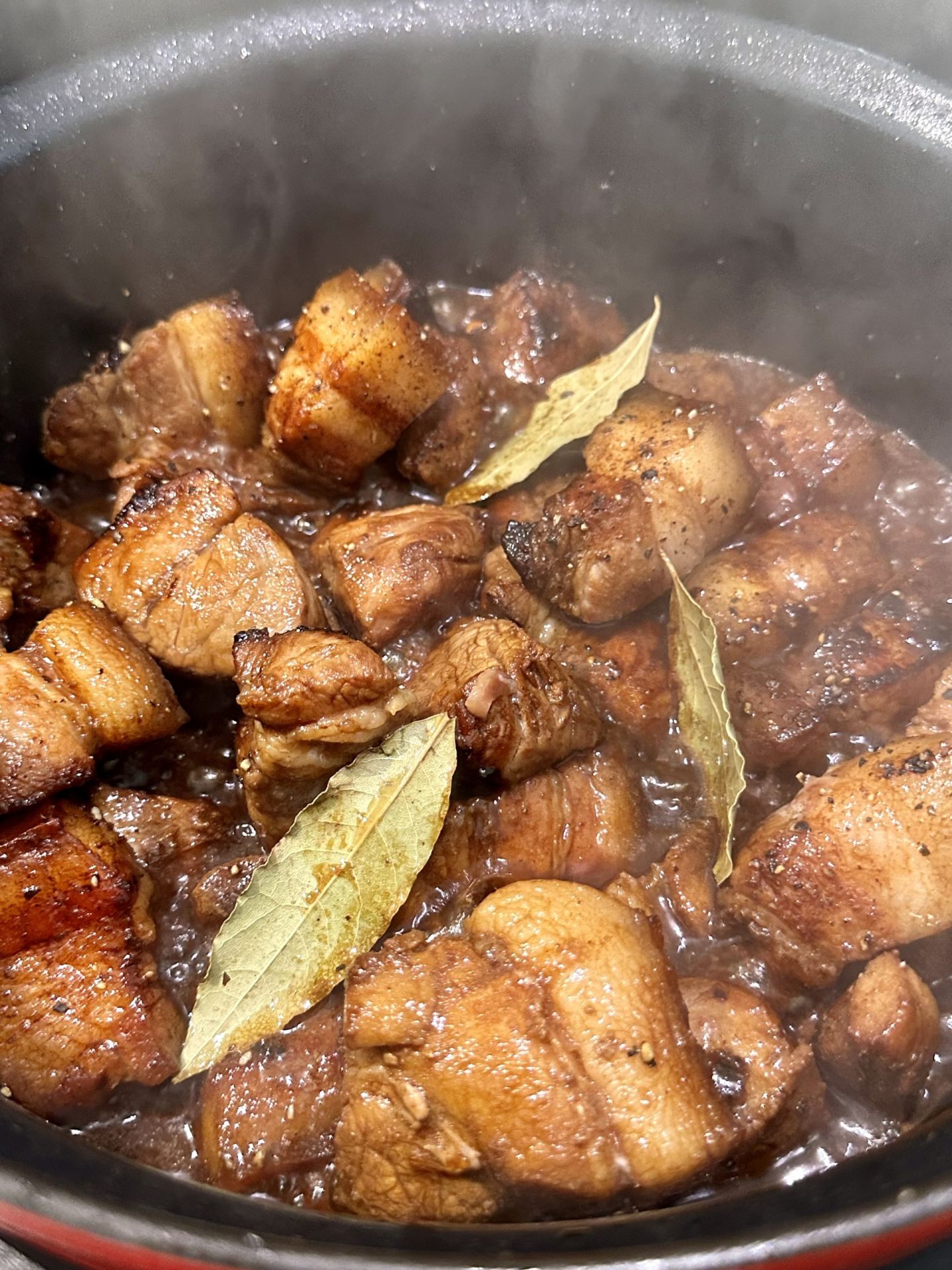
When the pork is already tender, add in the mushrooms. Continue to simmer until the mushrooms are cooked and tender about 5-10 minutes.
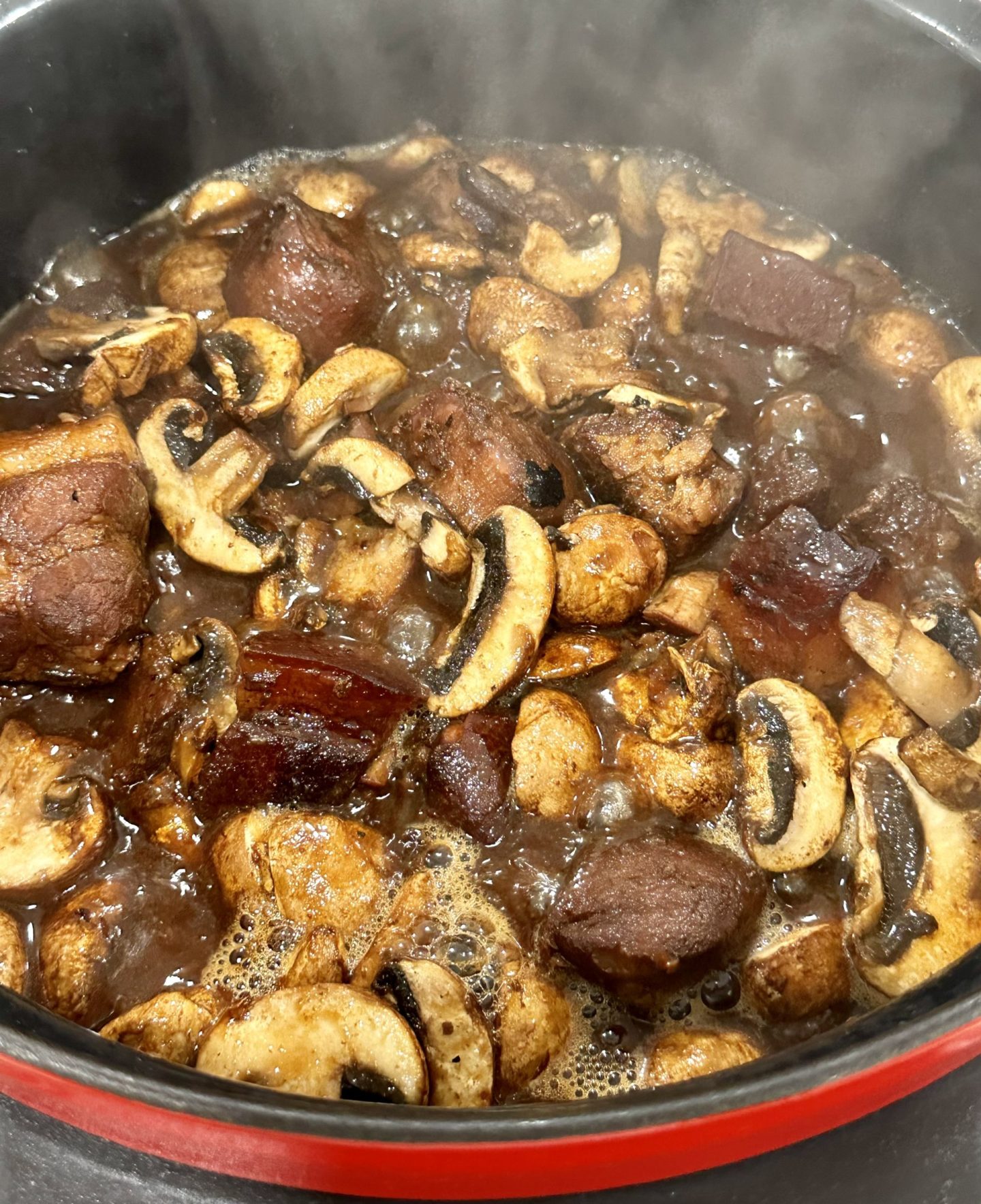
Add a few drops of sesame oil (just a few drops and not much more!). Serve hot with rice.
Cook’s Notes:
If using fresh Shiitake (4oz) – clean them quickly under running water or wipe the tops clean. Cut off the stem (can’t eat them too chewy!) and then chop.
If using dry Shiitake (2 oz) – reconstitute/rehydrate the mushrooms in warm water for about 20 mins or until tender. Reserve the water. Strain then and add as needed if the adobo sauce is beginning to dry up. This liquid is so full of flavor so don’t throw it away especially if you like a more liquidy adobo.
If you like what you see and would like to receive new recipe updates we’d love you to subscribe to our posts and join our site. Also, do like us on Facebook so you can get the latest updates and so much more. Thanks for visiting and happy browsing!
Since then we have a great high priest who has passed through the heavens, Jesus, the Son of God, let us hold fast our confession. For we do not have a high priest who is unable to sympathize with our weaknesses, but one who in every respect has been tempted as we are, yet without sin. Let us then with confidence draw near to the throne of grace, that we may receive mercy and find grace to help in time of need.
(Hebrews 4:14-16 ESV)
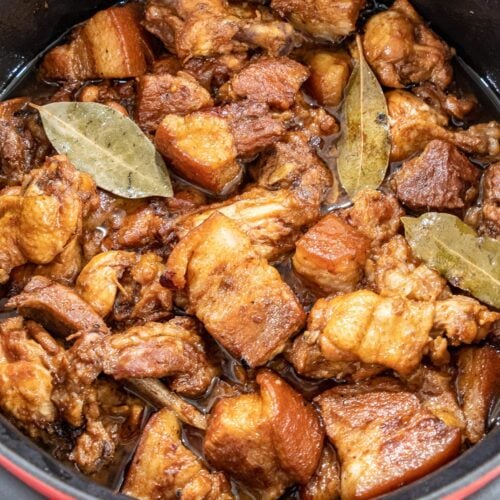
Ultimate Pork Adobo (Chinese Style)
Ingredients
- 1 Kilo (2.2 lbs) pork, get the part with some fat on it like pork shoulder, boneless country-style ribs, or pork belly
- 1 1/2 Tbsp Oyster sauce
- 2 Tbsp Brown sugar, adjust to taste
- 1/4 cup Soy sauce – I use Kikkoman soy sauce.
- 6-8 cloves Garlic, peeled then minced, crushed or chopped (a small head of garlic may be used)
- 2 Bay leaves
- Freshly ground pepper or whole black peppercorns, to taste
- 8 oz fresh mini-bella/portobello mushrooms or 2 – 4 oz shiitake mushrooms fresh or dry – see notes on how to prep the dry shiitake mushrooms
- A few drops of sesame oil Very essential!
Instructions
- Clean the pork. Cut up the pork adobo style – about 1 1/2 – 2 inch cubes or chunks. They will shrink as they cook so I make it a little bigger.
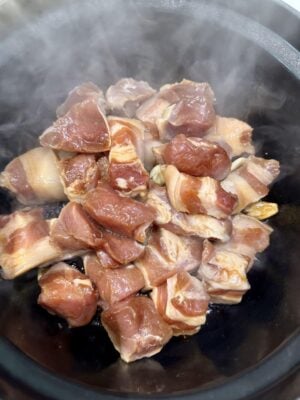
- In a deep pan or a Dutch oven, mix the soy and oyster sauces, sugar, garlic, and ground or whole peppercorns. Add the pork and coat with the sauce. Insert the bay leaves.

- Bring to a boil then cover and simmer on lowest heat setting until pork is tender, about 40-60 minutes depending on the size.
- When the pork is already tender, add in the mushrooms. Continue to simmer until the mushrooms are cooked and tender about 5-10 minutes.

- Add a few drops of sesame oil (just a few drops and not much more!). Serve hot with rice.
Notes
Nutrition
Last updated on July 26th, 2023 at 08:48 pm

Oh. My.
Haha, Abby!!! That looks terrific, and must be so fragrant – great recipe!
It is a family favorite, I say that in behalf of all Filipinos! Thanks Jen!
Wow..your pork adobo look amazing. What a great recipe and I actually like your version. Very flavorful! I like both dry and fresh shiitake…for some reason dry ones always giving me more flavor but fresh ones the final taste so sometimes I would just through in the soups few dry just for flavor and chop the fresh. This is def. must try! Thank you for sharing!
Thanks, Sandra! I love both the dry and fresh variety though you are correct that the dry ones have more flavor! I only like the fresh ones here because they are meatier and absorbs the sauce a lot more. Thanks for visiting!
A must-try! 🙂
Hi Lea! Hope you like it when you get the chance to try it! Thanks for joining our site!
Hi Sandra! Hope you can try it, 'cause this is a really wonderful dish (am biased of course!). You're right, the dried ones have more flavor especially their liquid. I like the fresh ones for this because they have more "meat" on them rather than the dried ones but adding either to this dish bring out more flavor and texture! Thanks for visiting!
OMG I have to try this recipe soon, have pinned it, thanks.
Thanks, Debs! Hope you like it and thanks for stopping by. Will check out the link you sent.
Hi there! Glad to have found your blog and another kindred soul in Filipino home cooking. I saw your Facebook page and was curious so here I am. Hope you come visit mine, too. This is a very delicious pork adobo recipe and now I'm hungry just reading your post. Thanks for sharing. Catch you soon!
Hi Betty! So glad you found us and so delighted to learn you are a Filipino blogger too! Small world. It's a pleasure to meet you! 🙂
Hi there! I've tried some of your recipes and my family loves them. Can't wait to try them all. By the way, can I use button mushroom instead of shitake? Thanks 🙂
Hi Gay! Thanks for stopping by. Glad you and family enjoyed the recipes. Yes, you can use button mushrooms. Have tried them already myself. 🙂
Thank you! I will cook adobo for dinner.So excited 🙂
Enjoy this yummy Adobo! 🙂
sounds amazing.
It truly is yummy! Thanks. 🙂
this is one of my favorite meals u have posted. i make 2-3x a month. thx for your recipes abby, they are some of my favorites
Oh I am so delighted to know that, so glad you have enjoyed this. I am in-love with this recipe, too. Thanks for stopping by.
Last week I maked the chicken version. Today the pork.
Ik loved the chicken, so I think te pork is also adorable….
I love them both Gea! Please enjoy! 🙂
This recipe looks amazing. Just wondering…My kids love adobo with lots of sauce to mix with their rice. Does your recipe have a good amount of sauce? If not, do you have any suggestions on increasing the sauce w/o decreasing the taste?
There should be enough sauce especially when you add the mushrooms at the end since they give up some liquid as they cook. Please enjoy.
Hi Abby! Do you think I could make this in a slow cooker? It seems a lot safer than leaving it to simmer on the stove for such a long time. If yes, would I have to adjust the cooking time?
Am sure cooking this on a slow cooker should be fine. Cook it on low for about 5-6 hours or until meat is fully tender. Enjoy and thanks for stopping by Guinan.
Toasted sesame oil or the stuff you fry with?
Am so sorry to miss this – the regular sesame oil should do, that's what I use.
Do we need to add water? How much?
I never found the need to add water as it creates its own sauce though not a lot. If you wish for a more saucy adobo perhaps add half a cup but you may need to adjust the seasoning a bit so the taste doesn't get diluted. Also, I would suggest using the liquid from the reconstituted dried shiitaki as that would add flavor rather than dilute it.Thanks for asking!
I had never tried this version of adobo before. It is absolutely delicious! Love the addition of mushrooms.
I am so happy you enjoyed it Tara! Thanks for trying and letting us know! 🙂
Hey Abby,
I tried your recipe and it's DELICIOUS!!! from now on, this will be the way to cook my adobo. My "future" in-laws love it and me and my adobo is the star of the night. plus pretty points for me. hehehe
Thank you and I wish you and your family a Happy New Year!
Thank you! I am so delighted you and your future family enjoyed it! Wishing you a wonderful year ahead, too!
Just found your blog and am delighted to read the scripture verses which I find to be very refreshing and uplifting. May God continue to bless you.
Hi, do you have an instant pot version of this recipe?
Author
Not yet but intending to make it soon. I do have an instant pot version with chicken so you can simply replace it with pork though adjust the time because it takes longer to cook than chicken. Here’s the link – https://www.manilaspoon.com/2017/04/instant-pot-chicken-adobo.html
It’s been almost 13yrs since I’ve had Filipino adobe. I think I remember there being potatoes, onions, & chunks of carrots in it, or was that a different Filipino recipe?
Author
Some add veggies but the traditional adobo doesn’t have any. It’s a personal preference. I don’t add any on mine but simply serve vegetables on the side.